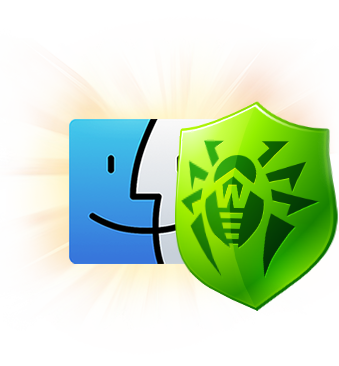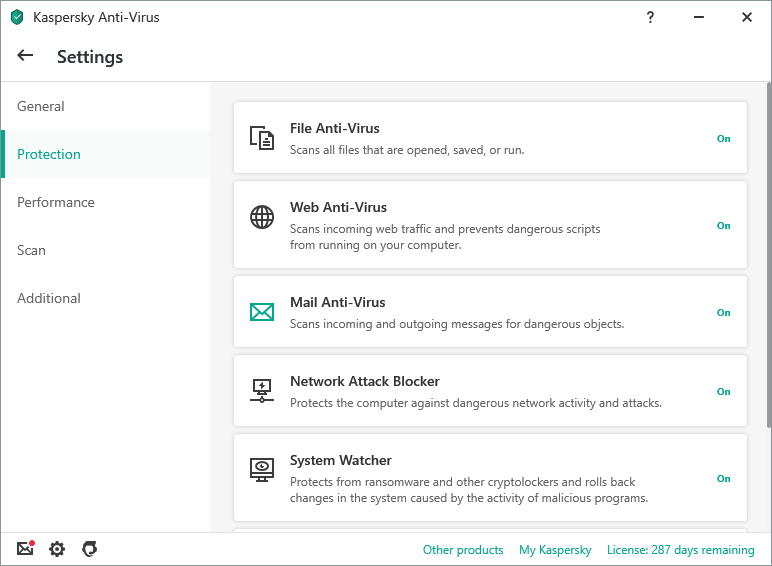- Kaspersky 19 For Mac
- Kaspersky Or Dr Web For Mac Os
- Kaspersky For Mac Free
- Mac Kaspersky Installer
- Kaspersky 20 For Mac
- Kaspersky For Mac Download
Eset Nod32 Kaspersky Avast Dr Web Avira 2020 Avira 2019 App Review, Avira 2019 Vpn Port Forwarding, Free Antivir Avira 2019 Download Chip, Avira 2019 Antivirus Xp Sp2 32 Bit, Free Avira Download Full Version 2019, Avira 2019 Est Il Un Bon Antivirus, How To Restart Avira 2019 Antivirus, Avira 2019 Antivirus Mac Download, Avira Internet Security 2019 Trial, Avira 2019 Vs Avast Mac, is a.
Paket ini termasuk kunci dan crack,reg untuk perangkat lunak antivirus berikut: ESET NOD32, Kaspersky, Avast, Dr.Web, Avira KeysKaspersky: Antivirus, Internet Security, Kaspersky PURE Total Security. Kaspersky Lab internal testing concludes consuming only 2% CPU impact on performance and is designed to maintain a user friendly Mac-like interface with which Mac users are familiar. Kaspersky Anti-Virus for Mac contains definitions to detect and block malware affecting Windows, Linux. 2019 Kaspersky Endpoint Security 11 for Mac (version 11.0.0.501c): patch C id: 15318 Updating to macOS Catalina (version 10.15) with Kaspersky Endpoint Security 11 for Mac installed.
| Developer(s) | Doctor Web |
|---|---|
| Initial release | 1992 |
| Stable release | |
| Operating system | Linux macOS Microsoft Windows DOS OS/2 Windows Mobile Android BlackBerry |
| Available in | Russian, English, French, German, Japanese, Korean |
| Type | Antivirus |
| Website | www.drweb.com |
Dr.Web is a software suite developed by Russian anti-malware company Doctor Web. First released in 1992, it became the first anti-virus service in Russia.[1]
The company also offers anti-spam solutions and is used by Yandex to scan e-mail attachments. It also features an add-on for all major browsers which checks links with the online version of Dr Web.[2]
Dr.Web has withdrawn from AV tests such as Virus Bulletin VB100% around 2008 stating that they believe that virus scans on viruses are different subject from that of real world malware attacks.[3]
Critics, reviews and reliability[edit]
Staunch anti-adware policy led to software developers complaints that Dr.Web treated their virus free applications as 'virus' and receive no responds from Dr.Web if they try to contact Dr.Web to resolve the issue.[4][4]
Notable discoveries[edit]
Flashback Trojan[edit]

Dr.Web discovered the Trojan BackDoor.Flashback variant that affected more than 600,000 Macs.[5]
Trojan.Skimer.18[edit]
Dr.Web discovered the Trojan.Skimer.18, a Trojan that works like an ATM software skimmer.[6] The Trojan can intercept and transmit bank card information processed by ATMs as well as data stored on the card and its PIN code.
Linux.Encoder.1[edit]
Dr.Web discovered the ransomware Linux.Encoder.1 that affected more than 2,000 Linux users.[7] Linux.Encoder.2 which was discovered later turned out to be an earlier version of this ransomware.
Trojan.Skimer discovery and attacks on Doctor Web offices[edit]
Doctor Web received a threat supposedly from the Trojan writers or criminal organization sponsoring this malware's development and promotion:[8] On March 31 2014, after two arson attacks were carried out on Igor Daniloff's anti-virus laboratory in St. Petersburg,[9] company received a second threat. Doctor Web released a statement that the company considers it its duty to provide users with the ultimate protection against the encroachments of cybercriminals and consequently, efforts aimed at identifying and studying ATM threats with their ATM Shield.[10]
Kaspersky 19 For Mac
See also[edit]
References[edit]
- ^'Dr. Web LTD Doctor Web / Dr. Web Reviews, Best AntiVirus Software Reviews, Review Centre'. Reviewcentre.com. Retrieved 2014-02-17.
- ^Web, Doctor (2013-10-07). 'Dr. Web LinkChecker :: Add-ons for Firefox'. Addons.mozilla.org. Retrieved 2014-02-17.
- ^'Doctor Web: statement on Virus Bulletin comparative reviews'. news.drweb.com. Retrieved 2015-11-03.
- ^ ab'Drweb and false positive'. Malwarebytes Forums.
- ^Greenberg, Andy (April 9, 2012). 'Apple Snubs Firm That Discovered Mac Botnet, Tries To Cut Off Its Server Monitoring Infections'. Forbes. Retrieved April 10, 2012.
- ^'Trojan.Skimer.18 infects ATMs'. news.drweb.com. Retrieved 2015-11-27.
- ^Dr.Web (November 6, 2015). 'Encryption Ransomware Threatens Linux Users'. Forbes. Retrieved November 16, 2015.
- ^'Dr.Web - ATM Trojans – Doctor Web and ATM Trojans'. antifraud.drweb.com. Retrieved 2015-12-09.
- ^'ATM Skimmer Gang Firebombed Antivirus Firm — Krebs on Security'. krebsonsecurity.com. Retrieved 2015-12-09.
- ^''На карте – ваши деньги'! Банкоматные троянцы угрожают вам, а их распространители – поджогами и физической расправой сотрудникам компании 'Доктор Веб''. news.drweb.ru. Retrieved 2015-12-09.
External links[edit]
- Official website(in English)
Kaspersky Or Dr Web For Mac Os
Kaspersky Anti-Virus 2011 (version 11.0) on Windows 7 | |
| Developer(s) | Kaspersky Lab |
|---|---|
| Initial release | 1997 |
| Stable release | 2020 (20.0.14.1085(e)) (23 October 2019; 12 months ago[1]) [±] |
| Operating system | Microsoft Windows, macOS, Linux, Android, iOS |
| Type | Antivirus |
| License | Freemium |
| Website | www.kaspersky.com/kaspersky_anti-virus |
Kaspersky Anti-Virus (Russian: Антивирус Касперского (Antivirus Kasperskogo); formerly known as AntiViral Toolkit Pro; often referred to as KAV) is a proprietary antivirus program developed by Kaspersky Lab. It is designed to protect users from malware and is primarily designed for computers running Microsoft Windows and macOS, although a version for Linux is available for business consumers.[citation needed]
Product[edit]
Kaspersky Anti-Virus features include real-time protection, detection and removal of viruses, trojans, worms, spyware, adware, keyloggers, malicious tools and auto-dialers, as well as detection and removal of rootkits. It also includes instantaneous automatic updates via the 'Kaspersky Security Network' service.[citation needed]
According to Kaspersky, 'Kaspersky Security Network service allows users of Kaspersky Lab security products from around the world to help facilitate malware identification and reduce the time it takes to provide protection against new (“in the wild”) security risks targeting your computer.[citation needed]}
Microsoft Windows users may download an antivirus rescue disk that scans the host computer during booting inside an isolated Linux environment. In addition, Kaspersky Anti-Virus prevents itself from being disabled by malware without user permission via password access prompts upon disabling protection elements and changing internal settings. It also scans incoming instant messenger traffic, email traffic, automatically disables links to known malware hosting sites while using Internet Explorer or Firefox, and includes free technical support and free product upgrades within paid-subscription periods.[2]
Limits[edit]
Kaspersky Anti-Virus lacks certain features found in Kaspersky Internet Security. These missing features include a personal firewall, HIPS, Secure Keyboard, AntiSpam, AntiBanner and parental control tools.[2]
Also, Kaspersky, like the majority of its competitors, is incompatible with many other anti-virus and anti-spyware software.[3]
Security vulnerabilities[edit]

In 2005, two critical flaws were discovered in Kaspersky Anti-Virus. One could let attackers commandeer systems that use it,[4] and one allowed CHM files to insert malicious code.[5] Days later, the software maker had offered preliminary protection to customers, and a week later a permanent patch made available.[6]
Operating systems[edit]
Linux edition[edit]
An edition of Kaspersky's anti-virus solution for Linux workstations is available to business consumers.[7] It offers many of the features included in the mainstream version for Windows, including on-access and on-demand scanners.
Specialized editions of Kaspersky Anti-Virus are also available for a variety of Linux servers and offer protection from most forms of malware.
Mac edition[edit]
The newly released Macintosh capable edition of Kaspersky Anti-Virus is compatible on (Intel Processor Based) Mac OS X Tiger and higher to include the brand new version Mac OS X Snow Leopard, released in August 2009. Kaspersky Lab internal testing concludes consuming only 2% CPU impact on performance and is designed to maintain a user friendly Mac-like interface with which Mac users are familiar. Kaspersky Anti-Virus for Mac contains definitions to detect and block malware affecting Windows, Linux and macOS alike. Kaspersky Anti-Virus for Mac also scans shared folders of users running Windows using Virtual PC on capable Apple Macintosh personal computers.[8]
System requirements[edit]
| Component | Windows XP | Windows Vista or later | Mac OS X v10.6 or later |
|---|---|---|---|
| Processor | IntelPentium 4 or equivalent; 800 MHz | IntelPentium 4 or equivalent; 1 GHz | N/A |
| RAM | 512 MB | 1 GB | 1 GB |
| Free hard drive space | 480 MB | 480 MB | 350 MB |
A DVD-ROM or CD-ROM drive, Internet Explorer 8 or above and Windows Installer 3.0 or above are also required for the installation of Kaspersky Anti-Virus in Windows. The latest version can either be downloaded from their official website or purchased through retail.
Awards[edit]
According to AV-Comparatives, Kaspersky Anti-Virus rates highly amongst virus scanners in terms of detection rates and malware removal, even despite the fact that the program has failed two Virus Bulletin tests in 2007 and another two in 2008.[9] For example, in latest[when?] Malware Removal test done by AV-Comparatives the Kaspersky Antivirus 2013 was awarded the highest 'Advanced+' rating and was able to successfully remove all of 14 malware samples used in that test and in the following File Detection test Kaspersky Antivirus 2013 was also able to achieve the same 'Advanced+' rating with a 99.2% sample detection rate.[10][11] In addition, PC World awarded Kaspersky Anti-Virus 6 the highest rank in its 2007 anti-virus comparative.[12] The well-known and highly regarded Ars Technica lists Kaspersky as one of the best choices for Anti-Virus on the Windows platform.[13]
Kaspersky Anti-Virus was 'A-listed' by the UK PC journal PC Pro in late 2007, where it scored very highly for detection and removal of malware.[14] PC Pro attributes this to “a combination of the software’s heuristic scanning and uncompromising approach to database updates.[14] While many packages check for new virus signatures on a daily basis, Kaspersky runs to an hourly schedule, improving your chances of being immunized before an infection reaches it.”[15]
Criticisms and controversies[edit]
Kaspersky For Mac Free

In March 2015, Bloomberg accused Kaspersky of having close ties to Russian military and intelligence officials.[16] Kaspersky criticized the article in his blog, calling the coverage 'sensationalist' and guilty of 'exploiting paranoia' to 'increase readership'.[17]
In June 2015, United States National Security Agency and United Kingdom Government Communications Headquarters agents broke Kaspersky antivirus software so that they could spy on people, leaks indicate.[18]
See also[edit]
Mac Kaspersky Installer
References[edit]
- ^'Kaspersky Anti-Virus 2020 release notes'. Kaspersky Lab. Retrieved 30 October 2019.
- ^ ab'How Kaspersky Anti-Virus 2013 differs from Kaspersky Internet Security 2013'. Kaspersky Lab. Retrieved 2013-06-29.
- ^'List of applications incompatible with Kaspersky Anti-Virus 2013'. Kaspersky Lab. 2013-04-19. Retrieved 2013-06-19.
- ^'Flaw found in Kaspersky antivirus'. ZDNet. 2005-10-03. Retrieved 2013-06-19.
- ^'Kaspersky compromised by another security breach'. Techworld. 2005-10-11. Retrieved 2013-06-19.
- ^Evers, Joris. 'Kaspersky confirms antivirus software flaw'. ZDNet. Retrieved 2020-07-02.
- ^'Kaspersky Anti-Virus for Linux / Windows Workstation'.
- ^'Kaspersky Security for Mac'. Kaspersky Lab. Archived from the original on 2009-12-14. Retrieved 2012-12-18.
- ^'All VB100 test history for vendor Kaspersky Lab'. virusbulletin.com. Retrieved 2018-09-29.
- ^'AV-Comparatives - Malware Removal Test'(PDF). Av-comparatives.org. Retrieved 2013-06-19.
- ^'AV-Comparatives - File Detection Test of Malicious Software'(PDF). Av-comparatives.org. Retrieved 2013-06-19.
- ^'Top Antivirus Performers'. PC World. 2007-04-23. Archived from the original on 2007-04-26.
- ^'Five important security apps for Linux, Mac OS X and Windows'. Ars Technica. 2008-04-24. Retrieved 2013-06-19.
- ^ ab'Internet Security Reviews'. PC Pro. Retrieved 2012-12-18.
- ^'Kaspersky Anti-Virus 7.0 wins top awards from PC Pro'.
- ^Matlack, Carol (2015-03-19). 'The Company Securing Your Internet Has Close Ties to Russian Spies'. Bloomberg.
- ^'Eugene Kaspersky intensifies US vs Russia flame war, accusing Bloomberg of creating 'conspiracy theories' about his company - Computing'.
- ^Griffin, Andrew (23 June 2015). 'GCHQ and NSA broke antivirus software so that they could spy on people, leaks indicate'. London: The Independent. Retrieved 24 June 2015.
External links[edit]
Kaspersky 20 For Mac

Kaspersky For Mac Download
